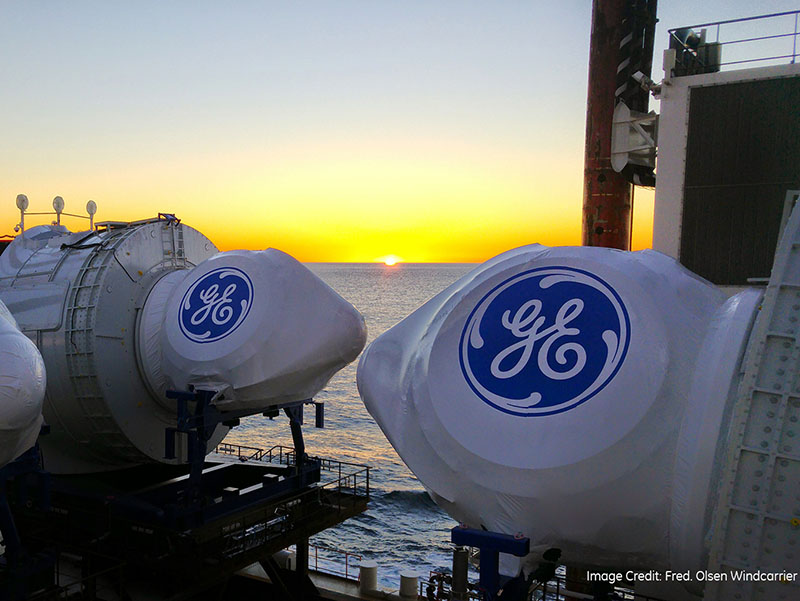(Bloomberg) — Blade by blade, General Electric Co. is building part of its future a few miles off the Rhode Island coast, turning a one-time piece of Enron Corp. into a global renewable-energy business.
GE shipped 400-ton nacelles and other massive equipment from its factories in Europe to Providence this summer to outfit the Block Island project, the first offshore wind farm in the U.S. The turbines — each about twice the height of the Statue of Liberty — were installed last week and are set to go online later this year.
The Boston-based manufacturer is joining a rush to meet the world’s burgeoning appetite for wind and water power, fueled by falling costs for renewable energy. As GE builds a new standalone business in part with assets acquired from Alstom SA, rivals such as Siemens AG are strengthening their offerings with deals and joint ventures of their own.
“These guys are suddenly chomping at the bit to supersize in the business,” said Nicholas Heymann, an analyst with William Blair & Co.
GE’s challenge is daunting: It trails companies such as Xinjiang Goldwind Science & Technology Co. in onshore wind and faces a steep climb in the offshore market against competitors such as a Vestas Wind Systems- Mitsubishi Heavy Industries Ltd. joint venture.
Old Foes
Siemens announced a deal in June to combine its wind-turbine business with Spain’s Gamesa Corp. Tecnologica SA to create potentially the world’s biggest maker of wind turbines. GE is using deals of its own to push into renewable energy as it focuses on big-ticket industrial goods and exits most finance and consumer businesses.
The company picked up renewable energy assets, including offshore wind turbines and hydroelectric equipment, as part of its $10 billion acquisition of Alstom’s power operations last year. That complemented an existing onshore business GE built after acquiring Enron’s former wind unit in 2002, and prompted the maker of jet engines and locomotives to make renewable energy one of its eight standalone manufacturing divisions.
GE’s latest project is coming together off the coast of Rhode Island near a small island known for its summer beach houses and a Kennedy family wedding in 1993. The 30-megawatt, $300 million Block Island Wind Farm is modest in size compared with developments in Europe with capacities of hundreds of megawatts.
But since developer Deepwater Wind had been working with Alstom for the 589-foot turbines, Block Island gives GE a toehold in the nascent market for offshore wind. Before buying the Alstom assets, GE had almost no presence in that part of the market.
Another source of demand may come from nearby Massachusetts, where Governor Charlie Baker signed a bill this month for local utilities to buy 1,600 megawatts of offshore wind energy by 2027. That’s the nation’s biggest commitment to the power source, with another 1,200 megawatts to come from other renewable sources.
‘Growth Engine’
“We can be one of the growth engines for the company,” Jerome Pecresse, chief executive officer of GE Renewable Energy, said in a telephone interview. “We can be one of the most global businesses in GE.”
The 13,000-employee renewables unit could win orders this year in China, Mexico and Australia. GE may also look to buy its way to a bigger portfolio, said Jeff Windau, an analyst with Edward Jones.
“I think they will be looking at doing some acquisitions,” Windau said. “Sometimes those small initial footprints give you that opportunity to build your expertise.”
GE has held preliminary talks ahead of a possible bid for Adwen, an offshore-wind joint venture between Gamesa and France’s state-owned Areva SA, according to a person familiar with the matter who asked not to be identified because the discussions are private. The venture may be sold in connection with Gamesa’s deal with Siemens.
Pecresse wouldn’t discuss whether his company is considering making an offer, saying only that GE doesn’t need deals to achieve its aggressive growth targets. A representative of Areva declined to comment, while Gamesa and Adwen didn’t respond to requests for comment.
Tax Credit
While demand for renewable energy is uneven across the globe, the U.S. is proving to be a bright spot. In December, lawmakers approved a budget with a multiyear extension of a tax credit for wind-energy production, a move GE CEO Jeffrey Immelt has hailed for strengthening the business.
The passage of the tax credit ensures steady demand for wind equipment at least through the end of the decade, said James Evans, a renewable energy analyst at Bloomberg Intelligence.
“It secures a strong midterm pipeline for a lot of these companies,” Evans said. That helps them “get away from the boom and bust cycle.”
Bloomberg News by Richard Clough




